Abstract
Tolerance is the most important norm of international law. It is undeniable. Tolerance is a new word included in the Russian language - a lacuna for the language. The concept of tolerance has become widespread in the social and humanitarian fields only at the end of the 20th century. According to the National Corpus of the Russian language, the word
Keywords: Tolerancefrequencyambivalencevalueslinguoculture
Introduction
The essence, meaning, boundaries, principles of tolerance are understood in different ways. Today it is one of the most controversial concepts. So, B. Williams entirely denies tolerance as a virtue and value. The traditional liberal paradigm, popular in the Anglo-American rationalist culture, is associated with the names of J. Horton, S. Mendus, P. Nicholson, and others. P. Nicholson justifies the need for tolerance through the irrationality of intolerance and as a boon, value and virtue. P. Nicholson is convinced that tolerance should be understood as respect for the human personality. He emphasizes that differences are recognized and respected not for their own sake, but as having significant value for people entitled to equal respect in society (Nicholson, 1985). J. Stuart Mill in his essay “On Liberty” considers tolerance as an important liberal value (Mill, 1947). The theory of tolerance by R. Forst is "the concept of respect", according to "which tolerant to each other parties respect each other in a more mutual sense: from a moral point of view, they consider themselves and others as citizens of a state in which members of all groups – majorities and minorities should have equal legal and political status” (Forst, 2003). M.B. Khomyakov summarizes the diversity of viewpoints on the phenomenon under discussion: tolerance is one of the most controversial values of modern society. This inconsistency, however, does not reduce its significance, but rather reflects the extreme complexity of the world in which modern man is doomed to live (Khomyakov, 2011).
Problem Statement
Tolerance is the most important norm of international law. It is undeniable. However, the term is ambiguous in modern Russian. It is a lacuna for the language. The concept of tolerance, which goes back to the medical term, has become widespread in the social and humanitarian fields only at the end of the 20th century. According to the National Corpus of the Russian language, the word tolerance entered the Russian lexicon at the beginning of the last century. The dynamics of the frequency of the word is characterized by the steady and positive dynamics: the index of frequency has increased by 300 times. In 2014, the word was the fifth in Yandex trends, showing a multi-million audience looking for the meaning of a word.
Research Questions
The understanding of the content of the concept “tolerance” by native speakers of Russian is increasingly moving in the negative direction, since negative cognitive signs accumulate in the semantic scope of the concept. Considering the concept tolerance, we find out the reasons for its ambiguous place in the Russian language picture of the world. The research material was composed of definitions and vocabulary articles, materials of the National Corpus of the Russian language, data obtained as a result of experiments of component-definition analysis and associative experiment, and the content of the Runet.
Purpose of the Study
So, the purpose of this work is to explore “tolerance” as a verbalized value using different sign objectivizations while analyzing vocabulary definitions, associative field, semantic field, Runet content.
Research Methods
The object of this study is the Russian language consciousness, access to the study of which was obtained in the course of a series of psycholinguistic and linguistic experiments and the use of a set of experimental methods to identify the content of the image of language consciousness. Based on the specifics of the subject matter, the main methodological basis was the so-called triangulation method – the integrative eclectic approach to the analysis of phenomena. The essence of the triangulation method consists in a multidimensional and multiaspectual analysis of a phenomenon in which the possibility to take into account the diversity of the manifestations of a phenomenon emerges, which guarantees an objective nature of the research. Mathematical processing of the obtained results and their visual representation in graphic form, meaningful interpretation of the results are also used. Complementary research methods: the method of component-definition analysis, psycho-semantic experiment, free associative experiment.
Findings
The first usage examples in the Corps are dated back to 1932:
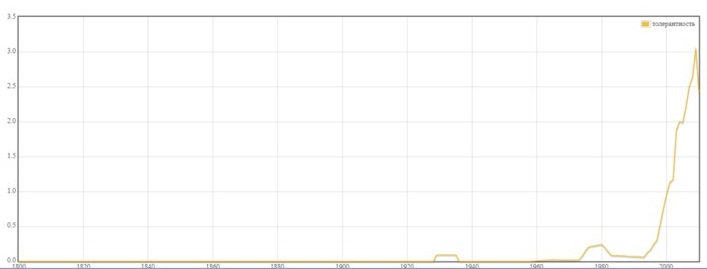
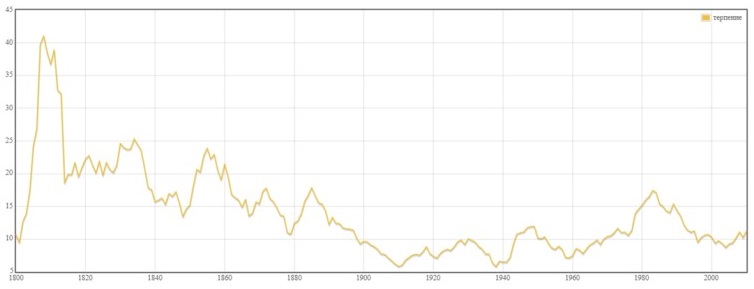
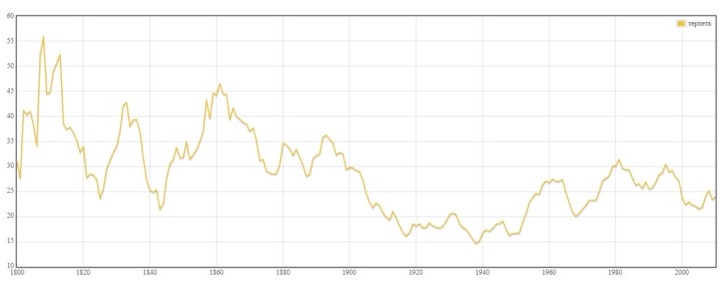
The lack of development of the concept
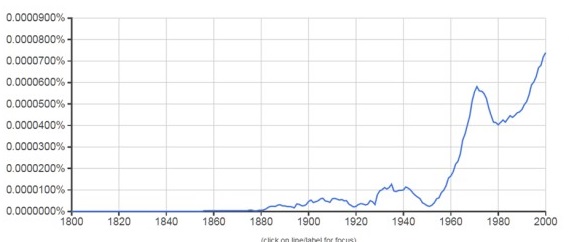
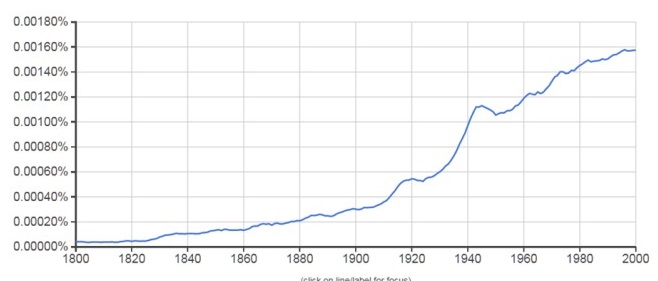
In the Foreign Dictionary, the word
“The interpretation of the words
However, the semantic similarity of the concepts of tolerance and patience is far from being an identity. A. G. Kudryavtsev regards patience with respect to tolerance as a hyperonym with respect to the hyponym (Kudryavtsev, 2012). Russian linguists who study tolerance emphasize its difference from patience. The difference is fundamental. According to V. G. Felde, patience “fosters respect for the “stranger’s”, but unlike tolerance, does not remove the “stranger” as a problem. Tolerance promotes respect for the elements of «strangeness». (Felde, 2015).
Patience is an integral feature of the Russian mentality. In the Russian picture of the world, this is an axiological phenomenon, while tolerance is not. It is beyond moral and other assessments. This is the statement of fact: there is something different, it has the right to coexist, to be near. Tolerance is indifferent. This situation is unlikely to suit the Russians. There is neither a word in the Russian mentality, nor, as it should be, a frame “to be near”, because indifference is a morally condemned category, while sympathy is positive. To be patient, to stand means to understand, accept, forgive. This spiritual series is understandable to every speaker of the Russian language, and understanding of a neighbor without emotions, both positive and negative, is not typical of Russian linguistic culture. The concept of
According to I. A. Sternin, the important features of the Russian mentality are "bipolar, black-and-white thinking (If he is not with us, he is against us) and dislike of compromises." “The word
The researcher’s conclusion is unequivocal: the difficulties of forming tolerant consciousness in Russian society are obvious, “since a large number of Russian communicative norms and traditions do not support this category” (Sternin, & Shilikhina 2001). This is an external manifestation of tolerance in communication. However, according to E.I. Kasyanova, the phenomenon of tolerance in the modern socio-cultural situation of Russia is “a form of collective identity among single and historically long-existing Russian nation, which, according to the words of the outstanding Russian philosopher I.A. Ilyina, is a "multi-peoples nation." In Russia, the culture of the annexed nations was not destroyed, but rather assimilated. As a result, a symbiosis was formed, based on tolerance, liberal attitude towards religion and adaptability (Kasyanova, 2008).
In A.V. Pertsev’s view, the primary obstacle to democratization “according to the Western type” is mental inertia, which is manifested in different ways among representatives of each social stratum in post-totalitarian societies. The philosopher believes that society should get rid of fighting spirit and intransigence – not only in ethics and politics, which is on the surface, but also in depth, in fundamental ideological views, in the field of ontology and epistemology (Pertsev, 2005). Our point of view is close to the opinion of K.A. Abulkhanova-Slavskaya. She unbiasedly believes that such Orthodox values as love for the neighbor, compassion, long-suffering, kindness, and charity adopted together with Christianity are a source of tolerance in Russia (Abulkhanova-Slavskaya, 1980). We emphasize that this is a manifestation of deep, essential tolerance, but not a superficial form of communicative practice, oriented on the protection of the decency and norms of verbal behavior. However, the importance of respecting the communicative norms cannot be discounted.
In the study of N. A. Nerovnaya, the content analysis of the concept “tolerance” in the Russian linguistic consciousness of the diachronic aspect showed the following: despite the rethinking of the concept in the popular consciousness, “stable cognitive signs have been discovered, which suggests that the concept has rooted in the consciousness of native speakers”. It is concluded that “an understanding of the content of the “tolerance” concept by Russian speakers is increasingly moving in the negative direction, since negative cognitive signs are accumulating in the semantic scope of the concept”. At the same time, “the concept under consideration remains in the zone of positive value meanings of the Russian consciousness” (Nerovnaya, 2017).
One can state the ambivalence of tolerance perception in minds of modern representatives of the Russian language. 272
Other focus pages containing posts about tolerance run into thousands. For the study by the method of continuous sampling, the material including quotes, aphorisms, jokes, anecdotes and statuses (more than 500 units) was collected. The content of the Runet, in particular social networks (VKontakte, etc.), found on the request
Now we cite several posts that assess tolerance positively. Our life is like an ocean – it flows and comes into contact, you touch in one place – it echoes at the other end of the world. (F. M. Dostoevsky) Mercy involves not only material help, but spiritual support of the neighbor too. Spiritual support, first of all, is not in condemning the neighbor, but in respecting his human dignity. (L. Tolstoy) If I differ from you, I’m not at all insulting you, but in the opposite endowing you. (Antoine de Saint-Exupery).
It is significant that in the quotations, positively evaluating a tolerant attitude, the word tolerance is not used.
Thus, the posts reflect two opposite trends: some of the materials contain a negative assessment, ridiculing the values of tolerance as alien to Russian culture; some express a sympathetic attitude towards the ideas of tolerance. Be it noted, if the Russians laugh at something, it means that reflection and mastery of the concept take place, since Russians do not laugh at the alien. Irony, joke, witticism have always been significant for native Russian speakers. For example, the concept belief deeply developed by Russian culture is traditionally considered important for native Russian speakers, and in the proverbs it is interpreted in two different ways. This characteristic of Russian culture (inconsistency) was emphasized repeatedly by philosophers, linguists, and others.
Conclusion
Thus, tolerance for the Russian language is an ambivalent concept. This is indicated by the results of associative experiments, ours and those conducted by other scientists (Sternin, Shilikhina, Nerovnaya, etc.). Centripetal forces relate
These two reciprocal directions are reflected in quotations, aphorisms, statuses, and jokes that Runet is flooded with. Some materials contain a negative assessment, roast of values of tolerance as alien to Russian culture. At the same time, laughter is evidence of the concept mastering, since a Russian does not laugh at the alien. The joke is significant for Russians. The witticism does not mean the denial of the phenomenon, but the reflection. One can compare this fact with the deeply developed Russian culture of the concept of faith, traditionally considered important for native Russian speakers: in the proverbs, the concept of
The understanding of the content of the concept “tolerance” by native speakers of Russian is increasingly moving in the negative direction, since negative cognitive signs accumulate in the semantic scope of the concept. At the same time, we emphasize that in the modern Russian picture of the world, a positive assessment of tolerance still prevails. So, the concept under consideration remains in the zone of positive value meanings of the Russian consciousness.
Tolerance is only a new word that is included in the Russian language. It is too early to talk about the formation of a new linguocultural value. The mental unit of
References
- Abulkhanova-Slavskaya, K.A. (1980). Activity and personality psychology. M .: Thought, 1980.
- Evgenieva, A. P. (1975). Great Academic Dictionary of the Russian Language. Moscow.
- Felde, V. G. (2015). Opposition “friend – foe” in culture. Author's abstract of dissertation for the degree of Candidate of philosophical sciences, Omsk.
- Forst, R. (2003). Toleration, justice and reason. The culture of toleration in diverse societies. Manchester University Press.
- Kasyanova, E.I. (2008). Tolerance in the modern sociocultural situation in Russia, Bulletin of Tomsk State University, 312.
- Khomyakov, M.B. (2011). Tolerance and its borders, National Psychological Journal, 2 (6), 25-33.
- Kudryavtsev, A.G. (2012). Tolerance in the linguistic picture of the world (ethnocultural specificity), Bulletin of Chelyabinsk State University, 6 (260), 83-85.
- Mikhailova, O.A. (2013). Tolerance and Patience: A Linguist's View. Philosophical and linguocultural problems of tolerance. Retrieved from: http://avkrasn.ru/article-1653.html
- Mill, J.S. (1947). On liberty, Wheeling (Illinois).
- Nadel-Chervinskaya, E.A. & Chervinsky F.D. (1995). Big Explanatory Dictionary of Foreign Words. Moscow.
- Nerovnaya, N. А. (2017). Diachronic comparison of the content of the concept “tolerance” in the Russian language consciousness, Perm University Herald. Russian and foreign philology, 9, 2, 39 – 46
- Nicholson, P. (1985). Toleration as a moral ideal. Aspects of toleration. Philosophical studies. London, New York.
- Pertsev, A.V. (2005). Modern world order and philosophy of tolerance, Philosophical and linguistic and cultural problems of tolerance. M.
- Philosophical Encyclopedic Dictionary, (2010). Philosophical Encyclopedic Dictionary. Moscow.
- Sternin, I. A., Shilikhina, K.M. (2001). Communicative aspects of tolerance. Voronezh.
Copyright information

This work is licensed under a Creative Commons Attribution-NonCommercial-NoDerivatives 4.0 International License.
About this article
Publication Date
29 March 2019
Article Doi
eBook ISBN
978-1-80296-057-0
Publisher
Future Academy
Volume
58
Print ISBN (optional)
-
Edition Number
1st Edition
Pages
1-2787
Subjects
Sociolinguistics, linguistics, semantics, discourse analysis, science, technology, society
Cite this article as:
Glazkova, S., Malkova, T., & Savelieva, T. (2019). Tolerance Through Prism Of Russian Language Consciousness. In D. K. Bataev (Ed.), Social and Cultural Transformations in the Context of Modern Globalism, vol 58. European Proceedings of Social and Behavioural Sciences (pp. 1529-1537). Future Academy. https://doi.org/10.15405/epsbs.2019.03.02.177
